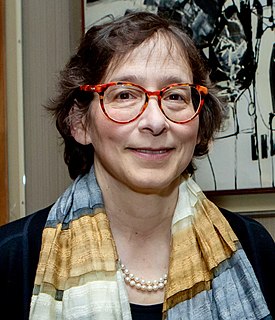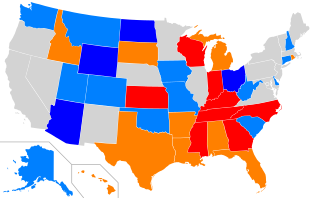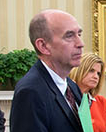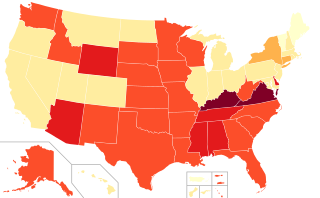Related Research Articles

The Sentencing Project is a Washington, D.C.-based research and advocacy center working for decarceration or to reduce the use of incarceration in the United States and to address racial disparities in the criminal justice system. For three decades the organization, with a small staff and funding from foundations and individuals, has regularly produced nonpartisan reports and research used by state and federal policymakers, administrators, and journalists as they consider crime and punishment.

The NAACP Legal Defense and Educational Fund, Inc. is a leading United States civil rights organization and law firm based in New York City.
Voter caging involves challenging the registration status of voters and calling into question the legality of allowing them to vote. Usually it involves sending mail directly to registered voters and compiling a list from mail returned undelivered. Undeliverable mail is seen as proof that the person no longer resides at the address on their voter registration. The resultant list is then used by election officials to purge names from the voter registration rolls or to challenge voters' eligibility to vote on the grounds that the voters no longer reside at their registered addresses.

Voter suppression is a strategy used to influence the outcome of an election by discouraging or preventing specific groups of people from voting. It is distinguished from political campaigning in that campaigning attempts to change likely voting behavior by changing the opinions of potential voters through persuasion and organization, activating otherwise inactive voters, or registering new supporters. Voter suppression, instead, attempts to reduce the number of voters who might vote against a candidate or proposition.

The Advancement Project is a politically liberal American nonprofit organization that focuses on racial justice issues. The organization has a national office in Washington, D.C., as well as a California-specific office based in Los Angeles.

Spencer A. Overton is an American lawyer, President of the Joint Center for Political and Economic Studies, and law professor at George Washington University Law School. He is a leading election law scholar, and is a tenured Professor of Law at George Washington University.

Bradley Joseph Schlozman is an American attorney who served as acting head of the Civil Rights Division of the United States Department of Justice under Attorney General Alberto Gonzales. A member of the Republican Party, Schlozman was appointed by Gonzales as the interim U.S. Attorney for the Western District of Missouri, replacing Todd Graves, and he assumed that office on March 23, 2006. In April 2007, Schlozman left the U.S. Attorney position to work at the Executive Office for United States Attorneys.

The American Center for Voting Rights (ACVR) was a non-profit organization founded by Mark F. "Thor" Hearne that operated from March 2005 to May 2007 and pushed for laws to reduce voter intimidation and voter fraud, and supported requiring photo ID for voters.

Pamela Susan Karlan is an American legal scholar who is the principal deputy assistant attorney general in the Civil Rights Division of the United States Department of Justice. She is on a leave of absence from Stanford Law School. A leading legal scholar on voting rights and constitutional law, she previously served as U.S. Deputy Assistant Attorney General for Voting Rights in the DOJ's Civil Division from 2014 to 2015.
Transgender disenfranchisement is the prevention by bureaucratic, institutional and social barriers, of transgender individuals from voting or participating in other aspects of civic life. Transgender people may be disenfranchised if the sex indicated on their identification documents does not match their gender presentation, and they may be unable to update necessary identity documents because some governments require individuals to undergo sex reassignment surgery first, which many cannot afford, are not medical candidates for, or do not want.

Voter ID laws in the United States are laws that require a person to provide some form of official identification before they are permitted to register to vote, receive a ballot for an election, or to actually vote in elections in the United States.
Shelby County v. Holder, 570 U.S. 529 (2013), was a landmark decision of the Supreme Court of the United States regarding the constitutionality of two provisions of the Voting Rights Act of 1965: Section 5, which requires certain states and local governments to obtain federal preclearance before implementing any changes to their voting laws or practices; and Section 4(b), which contains the coverage formula that determines which jurisdictions are subject to preclearance based on their histories of discrimination in voting.
Voter suppression in the United States is various legal and illegal efforts to prevent eligible voters from exercising their right to vote. Where found, such voter suppression efforts vary by state, local government, precinct, and election. Separately, there have also been various efforts to enfranchise and disenfranchise various voters in the country, which concern whether or not people are eligible to vote in the first place.

Warren Neil Eggleston is an American lawyer who served as the White House Counsel under President Barack Obama. Eggleston was the fourth person to hold this post during the Obama administration.

Felony disenfranchisement in the United States is the suspension or withdrawal of voting rights due to the conviction of a criminal offense. The actual class of crimes that results in disenfranchisement vary between jurisdictions, but most commonly classed as felonies, or may be based on a certain period of incarceration or other penalty. In some jurisdictions disfranchisement is permanent, while in others suffrage is restored after a person has served a sentence, or completed parole or probation. Felony disenfranchisement is one among the collateral consequences of criminal conviction and the loss of rights due to conviction for criminal offense. In 2016, 6.1 million individuals were disenfranchised on account of a conviction, 2.47% of voting-age citizens. As of October 2020, it was estimated that 5.1 million voting-age US citizens were disenfranchised for the 2020 presidential election on account of a felony conviction, 1 in 44 citizens. As suffrage rights are generally bestowed by state law, state felony disenfranchisement laws also apply to elections to federal offices.
Judith A. Browne Dianis is an American civil rights attorney. She is the executive director of Advancement Project, a liberal nonprofit organization based in Washington, D.C.
Thomas Alvin Farr is an American attorney. Farr was nominated by President Donald Trump for a judgeship on the United States District Court for the Eastern District of North Carolina in 2017, and again in 2018. Farr was considered a controversial nominee due to his alleged involvement in suppression of African-American voters. On November 29, 2018, Republican U.S. Senators Jeff Flake and Tim Scott announced their opposition to Farr's nomination, together with unanimous opposition of Senate Democrats, made it impossible for Farr's nomination to be confirmed.
Janai Nelson is an American lawyer, who currently serves as the Associate Director-Counsel of the NAACP Legal Defense Fund (LDF). She will become the organization's 8th President and Director-Counsel in the spring of 2022.
Glenn Duque Magpantay is the executive director of the National Queer Asian Pacific Islander Alliance, an instructor at Brooklyn Law School and Hunter College/CUNY, and a former civil rights attorney in the role of Democracy Program director for the Asian American Legal Defense and Education Fund. He is chair of the LGBT Committee of the Asian American Bar Association of New York, former co-chair of the Gay Asian & Pacific Islander Men of New York, and recognized as an "authority on the federal Voting Rights Act and expert on Asian American political participation, including bilingual ballots, election reform, minority voter discrimination, multilingual exit polling, and census." He has served as a commissioner on the New York City Voter Assistance Commission. He is also a contributing writer for the Huffington Post. The Glenn Magpantay Leadership Award at his undergraduate alma mater, the State University of New York at Stony Brook, is named after him.

The history of black suffrage in the United States, or the right of African Americans to vote in elections, has had many advances and setbacks. Prior to the Civil War and the Reconstruction Amendments to the U.S. Constitution, some blacks in the United States had the right to vote, but this right was often abridged or taken away. After 1870, blacks were theoretically equal before the law, but in the period between the end of Reconstruction era and the passage of the Civil Rights Act of 1964 this was frequently infringed in practice.
References
- ↑ "Legal Director". ForwardJustice.org. Retrieved June 16, 2019.
- ↑ Kay, Stanley (July 25, 2018). "The Highest Court in the Land". Sports Illustrated. Retrieved June 16, 2019.
- ↑ Harvard Law School Alumni Profile
- ↑ "Federal judge upholds North Carolina photo ID mandate". Baltimore Sun. Tribune news service. April 25, 2016. Retrieved June 17, 2019.
- ↑ Hair, Penda D. Louder than Words: Lawyers, Communities and the Struggle for Justice : A Report to the Rockefeller Foundation. New York: Rockefeller Foundation, 2001. Print.
- ↑ "Penda D. Hair." TopWonks Penda D Hair. TopWonks, n.d. Web. Topwonks.org.
- ↑ "Should Voting in an Election Be a Constitutional Right?". The New York Times. November 3, 2014. Retrieved June 16, 2019.
- ↑ Jarvie, Jennie (February 4, 2016). "Does North Carolina voter ID law suppress minority votes? A federal judge will decide". Los Angeles Times. Retrieved June 16, 2019.
- ↑ "Voter Protection Issues". AdvancementProject.org. Retrieved June 16, 2019.
- ↑ What’s Wrong with This Picture?: New Photo ID Proposals Part of National Push to Turn Back the Clock. (2011) Rep. Advancement Project, 13 Apr. 2011. Web. Advancementproject.org.
- ↑ "Neil Eggleston". www.fed-soc.org. Retrieved 2017-01-21.